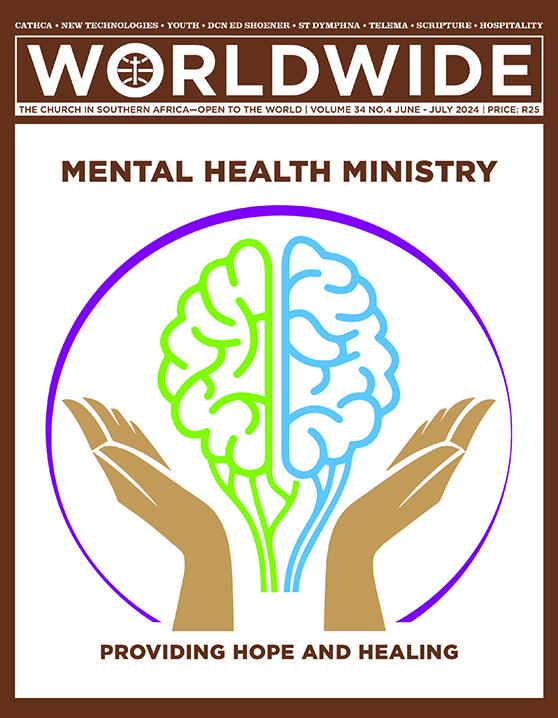
MENTAL HEALTH MINISTRY: PROVIDING HOPE AND HEALING
The colours symbolise peace and nature, the brain represents the mind and the hands imply care—thus giving the impression of ‘the mind in caring hands.’ (Lauren Bikhani, Mental Health Ministry Coordinator at All Saints Catholic Church, Ennerdale, Johannesburg).
Design by Warren Singh from DesignCreed.
YOUTH VOICES • HOLDING ON TO SCRIPTURE

THE MYSTERY OF JESUS’ SORROW
Challenging situations of life often shake our mental stability. Holding fast to Scripture and contemplating Jesus’ attitude when faced with indescribable suffering reassure us of a way towards achieving a healthy whole being.
BY JILL WILLIAMS | CANDIDATE LANDSCAPE ARCHITECT, PRETORIA
THE MIND is described as a ‘battlefield’ by some, such as Joyce Meyer, (Meyer 2002) who has written about the daily struggles of one’s mental life and how the enemy (the devil) has strategized and devised ways to prevent us from living joyfully. The prophet Jeremiah complains to the Lord: “Curse the day I was born! Why was I born? Was it only to have trouble and sorrow, to end my life in disgrace?” (Jeremiah 20:14, 18). Thankfully, we also learn that the outcome is rigged; Jesus has already achieved victory over our minds (soul), bodies, and our spirits through his passion, death, and resurrection. The Bible tells us that Jesus suffered every pain known to man, and as a result, understands our sufferings in a very real way. “He was pierced for our offenses, He was crushed for our wrongdoings; the punishment for our well-being was laid upon Him, and by His wounds we are healed” (Isaiah 53:5).
Trusting God’s mercy
When one reflects on the Sorrowful Mysteries of the Rosary—usually prayed on Tuesdays and Fridays—one sees how Jesus experienced the indescribable pain of both physical and mental torment, how it affected his well-being and how he dealt with it.
The first mystery sets the scene of the Sorrowful narrative. Jesus is praying in the Garden of Gethsemane. After three years of ministering, healing and teaching on the earth, his time of suffering had come. He had already announced this to his disciples, and made it clear that this was proclaimed by the prophets of old—in itself a form of dreadful anticipation. His humanity became very clear in this mystery. He asked God if he could refrain from drinking of the cup of suffering (Luke 22:42). The Son of God asked for—begged for—mercy from God the Father, although he knew that it was the only way to save all of humanity. This is the only time that I recall Jesus asking for mercy for himself. It is a special moment in time: a vista into the mind of Christ and the battle raging there. Jesus was so anxious, so stressed and distressed at the impending suffering he had to endure, that he experienced hematidrosis, the condition where one’s body expels great drops of blood (Luke 22:44).
Diligence is required in both the use of medication, and in taking the scriptural equivalent daily, to improve vitality.
One might be diagnosed with depression and may require the use of medication. However, dwelling on and reciting despair to oneself daily will merely cause one even more despair. Diligence is required in both the use of medication, and in taking the scriptural equivalent daily, to improve vitality. Jesus understands hopelessness and agony. “Yet not my will, but yours be done” (Luke 22:42). With these words, there is a shift in the vehicle of thought. Jesus no longer wallows in thoughts of despair, but prays for the will of the Father to be done. Why? Perhaps the words spoken by God to the prophet Jeremiah rang in Jesus’ Spirit: “For I alone know the plans I have for you, plans to prosper you and not to harm you; to give you hope and a future” (Jeremiah 29:11). Rejoicing and being joyful at all times is possible (Philippians 4:4-7), but expressing happiness pretentiously is not a sign of good mental health. So what does good mental health look like? The remaining Sorrowful mysteries offer us some insights.
Silent loving acceptance
The second mystery describes Jesus being scourged (John 19:1). Here he offers no objection to the multiple blows raining down on him. Instead, he is silent. This is a sign of submission; he does not wilt in despair, but rather offers his body, willingly, to be bruised. Looking at Jesus’ mental state, there seems to be a shift from the first to the second mystery. Jesus no longer questions the process or asks for mercy. He has reached a state of loving acceptance, as opposed to a resentment of his fate and of God. In this, he has been graced with an unfathomable inner strength from His Father.


In the third mystery, Jesus is crowned with thorns. (Matthew 27:27-29). This symbol is one of the most memorable in the Passion narrative, and is said to symbolise sin and suffering under the curse. According to Ryan (2024) the thorns in Jesus’ crown were probably made from the date palm, which hosts thick, hard, and long spikes. These thorns are said to cause immense pain, and contain toxins that lead to inflammation, bruising, and tissue damage. In this station, we see Jesus enduring emotional abuse and torment; even mocking directed at his identity. Yet Jesus remains silent. This torment pierces deeper than the blows to his body, yet Jesus keeps his mind set on pleasing his Father: fulfilling his purpose here on earth.


Expressing emotions
Emotions are an inherent part of our being that help us navigate situations and understand one another better. Keeping our emotional state at the fore, however, can cause us to be in a constant state of feeling overwhelmed. Good mental health enables us to feel and express our emotions in ways and in places that do not cause harm to others, acknowledging that the Holy Spirit is the guide we need for life’s journey, listening to it, and then obeying its instruction for the next step.
He did not moan or complain about the difficult journey or the weight of the cross, yet God allowed his tormentors to find someone to help him on his journey.
In the fourth Sorrowful Mystery, we see that although Jesus’ journey to Golgotha wore him out physically, he continued to interact with those near to him. Whilst being in pain, his mind was not on his present state, but on the fulfilment of his purpose. At this point in Jesus’ journey, he had fallen several times. He was then offered another grace: someone to help him carry his cross. He did not moan or complain about the difficult journey or the weight of the cross, yet God allowed his tormentors to find someone to help him on his journey. Jesus must have seen this as a sign of hope: My Father is still with me.
In the fifth and last mystery, Jesus speaks his last words and dies. He still thinks of his beloved mother and those for whom he is suffering. Before he dies, the reality of the present moment sinks in again and he experiences another state of deep agony: “My God, My God, why have you forsaken me?” (Matthew 27:45-47). Jesus is loaded down with the sins of the world—who would not cry out in utter despair? His situation was dire and yet he knew he had to continue. He then looked up to heaven and, as before, chose to turn away from thoughts of despair, and remembered the perfect will of the Father. “When Jesus had received the sour wine, he said, ‘It is finished,’ and he bowed his head and gave up his spirit” (John 19:30). His mission was complete—he willingly offered up his life, in loving surrender.
A weapon for a healthy mental condition
Like Jesus, our minds will be under attack from every side until the end. We must make sure that we defend the territory and retaliate with weapons that work: remembering our purpose on earth and choosing to recite Scripture (and not our problems) in the name of Jesus Christ, who has already won, not only the battle of the mind, but the entire war over our physical, emotional, and mental, health and well-being. “Why am I so sad? Why am I so troubled?”( Psalm 42:5) Aren’t people of God supposed to be happy? Aren’t their lives supposed to be nothing but sunshine and roses? Unfortunately this won’t always be the case. Even Jesus himself, who never sinned, experienced highs, lows, persecution and torment. These moments are opportunities to draw closer to God through surrendering and abiding in him: “I will put my hope in God, and once again I will praise him, my saviour and my God” (Psalm 42:5).

